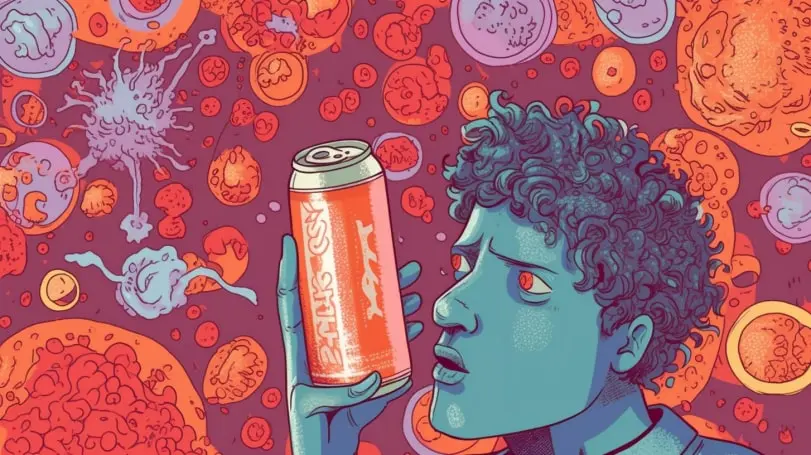Can Sprite Cause Cancer?
Can Sprite Cause Cancer? The question looms ominously, capturing our attention and raising concerns about our favorite fizzy beverage.
With the growing prevalence of cancer in modern society, it’s natural to wonder about the potential dangers lurking within our everyday indulgences.
So, is there any truth to the claim that Sprite, that refreshing and beloved soda, could be linked to cancer?
Prepare to delve into the realm of scientific investigation as we uncover the facts, examine the evidence, and separate myth from reality.
Strap in for a journey that will shed light on this pressing matter, ensuring that you can make informed decisions about your health and beverage choices.
Key Takeaways
- There are concerns about the safety of soda and its potential link to cancer.
- Uncertainty remains regarding Sprite’s potential to cause cancer.
- The phosphoric acid in Sprite and other sodas can increase stomach acidity, leading to heartburn, acid reflux, and dental problems.
- The caramel color in soft drinks may contain 4-MEI, a possible carcinogen, and excessive consumption of phosphoric acid-containing sodas can lead to tooth decay, weakened bone health, and low bone mineral density in women.
Understanding the Ingredients in Soda
An analysis of the ingredients in soda reveals a complex mixture of chemicals including flavorings, sweeteners, and preservatives.
While the sugar content in soda is well-known, many consumers are becoming more aware of the potential dangers associated with consuming too much sugar.
Consequently, artificial sweeteners have become increasingly popular as a means to reduce sugar intake while still satisfying a craving for something sweet.

However, navigating the world of soda options for health-conscious consumers can be challenging given conflicting information and marketing claims.
Artificial sweeteners such as aspartame and sucralose have been scrutinized for their potential negative health effects, including increased risk of cancer.
Some studies have suggested that these sweeteners may cause DNA damage or lead to an increase in tumor development.
However, other studies have failed to find any significant association between artificial sweeteners and cancer risk.
As with many areas of nutrition research, it can be difficult to make definitive conclusions due to study limitations and conflicting evidence.
Therefore, individuals should consider their overall diet and lifestyle habits when deciding whether or not to consume soda with artificial sweeteners or opt for alternative beverages altogether.
Can Sprite Cause Cancer?
First things first, let’s address the rumors head-on. Can Sprite cause cancer? Well, let me put your mind at ease.
There is currently no scientific evidence to suggest that Sprite, or any other carbonated beverage for that matter, directly causes cancer. Phew!
However, it’s important to remember that when it comes to cancer prevention and overall health, it’s all about maintaining a balanced lifestyle.

While Sprite itself may not be a cancer-causing culprit, it’s worth noting that excessive consumption of sugary drinks, including Sprite, can lead to weight gain, which is a known risk factor for various types of cancer. So, moderation is key!
Furthermore, some concerns have been raised about certain ingredients found in Sprite, such as artificial sweeteners and additives.
While these ingredients have been deemed safe for consumption by regulatory authorities, it’s always a good idea to be mindful of your overall intake of such substances.
Opting for natural, whole foods and staying hydrated with water are excellent choices for supporting your overall health.
Remember, when it comes to cancer prevention, it’s the bigger picture that matters.
Maintaining a healthy lifestyle, including a well-balanced diet, regular exercise, and avoiding excessive intake of sugary beverages, can greatly contribute to your overall well-being.
Phosphoric Acid and its Effects on the Body
Phosphoric acid, a common ingredient in many carbonated beverages, has been compared to battery acid due to its corrosive properties.
This acid is added to soda to give it a tangy taste and extend its shelf life. However, research shows that excessive consumption of phosphoric acid-containing sodas may lead to tooth decay and weakened bone health.

According to a study conducted by the American Journal of Clinical Nutrition, consumption of phosphoric acid-containing soda drinks was found to be significantly associated with low bone mineral density (BMD) in women.
The study further revealed that women who drank cola had lower BMD at the hip than those who did not consume these drinks.
Additionally, the acidic nature of phosphoric acid can erode tooth enamel leading to dental problems such as cavities and sensitive teeth.
It is therefore recommended that individuals limit their intake of soda containing this ingredient and opt for healthier alternatives such as water or natural fruit juices.
| Pros | Cons |
|---|---|
| – Gives soda a tangy flavor | – Erodes tooth enamel |
| – Extends shelf life | – Weakens bone health |
| – Corrosive properties make it useful in industrial applications | – Can cause kidney damage if consumed excessively |
The table above outlines some pros and cons associated with the use of phosphoric acid in soda production.
While it gives soda a tangy flavor and extends its shelf life making it more appealing commercially, excessive consumption can have detrimental effects on one’s health including weakened bone health due to low BMD levels and erosion of tooth enamel leading to dental issues like cavities and sensitivity.
It is therefore important for individuals to be mindful of their intake of this ingredient when consuming carbonated beverages.
Risks of Increased Acidity in the Stomach
Excessive acidity in the stomach can lead to a host of negative health outcomes.
One of the most common outcomes is acid reflux, which occurs when stomach acid flows back up into the esophagus, causing discomfort and potentially damaging the lining of the esophagus.

The primary cause of this increased acidity is typically poor diet or lifestyle choices, such as consuming too much spicy or acidic food, smoking cigarettes, and drinking alcohol.
Stomach health is crucial for overall well-being. An imbalanced pH level can disrupt digestion and lead to other health problems such as ulcers and inflammation.
While occasional bouts of acid reflux are common and usually not cause for concern, chronic acid reflux can be indicative of an underlying condition that requires medical attention.
In short, it is essential to maintain a healthy balance in terms of stomach acidity to avoid potential negative consequences for your digestive system and overall health.
Caramel Color and 4-MEI
Caramel color is a food additive commonly used in soft drinks and other processed foods, but concerns have been raised about its potential health risks due to the presence of 4-MEI. 4-MEI is a byproduct of the caramelization process and has been classified as a possible carcinogen by the International Agency for Research on Cancer (IARC).
The concern is that consuming large amounts of caramel-colored beverages may increase the risk of cancer.

While there are regulations in place for allowable levels of 4-MEI in caramel color, it’s important for consumers to be aware of how much they are consuming.
To address these concerns, regulatory agencies such as the Food and Drug Administration (FDA) have set limits on the amount of 4-MEI allowed in caramel color.
In 2011, California passed Proposition 65, which requires companies to label products that contain more than a certain level of 4-MEI.
Some companies have chosen to use alternative sweeteners or natural coloring agents instead of caramel color.
However, it’s important to note that there is currently no conclusive evidence linking caramel color consumption with an increased risk of cancer in humans. More research is needed to fully understand any potential health risks associated with this food additive.
As research continues, it will be important for regulatory agencies to stay updated and adjust their guidelines accordingly.
Studies on the Link Between Soda and Cancer
Recent studies have investigated the potential link between soda consumption and cancer, prompting the question of whether or not there is a correlation between the two.
One study published in the American Journal of Clinical Nutrition found that increased intake of sugar-sweetened beverages, including soda, was associated with an increased risk for colorectal cancer in women.

Another study published in PLOS ONE found that regular consumption of sugary drinks may be linked to an increased risk for pancreatic cancer.
In addition to its potential impact on cancer risk, soda consumption has also been shown to have negative effects on gut health.
One study published in Gut Microbes found that drinking high-fructose corn syrup-sweetened soft drinks altered gut microbiota composition and promoted intestinal inflammation.
This can lead to a host of health issues such as irritable bowel syndrome and inflammatory bowel disease.
While more research is needed on the link between soda consumption and cancer risk, these studies suggest that reducing or eliminating sugary drink intake may have significant health benefits.
Other Potential Health Risks of Drinking Soda
Moving on from the studies linking soda and cancer, it is important to note that there are other potential health risks associated with drinking soda.
One of the most well-known concerns is the high sugar content in most sodas, which can lead to sugar addiction and a host of related health issues.

Sugar addiction is a real problem for many people, and it has been linked to obesity, type 2 diabetes, heart disease, and other chronic health problems.
Additionally, the acidity of soda can also be harmful to dental health by eroding tooth enamel over time.
While these risks may not be as immediately life-threatening as some of the more extreme claims about soda causing cancer, they are still significant concerns that should not be ignored.
As such, it is important for individuals to weigh these potential risks against their own personal preferences when deciding whether or not to consume soda on a regular basis.
Making Informed Choices for Your Health
It is crucial for individuals to make informed choices about their health by considering the potential risks associated with consuming high-sugar and acidic beverages like soda.
While there is no conclusive evidence that drinking soda causes cancer, studies have shown a correlation between high consumption of soda and an increased risk of other health issues such as obesity, type 2 diabetes, and heart disease.
Additionally, the high levels of sugar in soda can lead to tooth decay and other dental problems.
To make healthy lifestyle choices, individuals should consider alternative beverages such as water or unsweetened tea.
These options not only provide hydration without added sugars or acids but also offer additional health benefits such as promoting weight loss and reducing inflammation.
Furthermore, incorporating more whole foods into one’s diet can provide essential nutrients while avoiding the negative effects of processed foods like sugary drinks.
By making informed decisions about what they consume, individuals can take control of their health and reduce their risk of developing chronic illnesses associated with unhealthy dietary habits.
Frequently Asked Questions
What are some alternative beverages to soda that are healthier for you?
Healthy alternatives to soda include Kombucha and juice, which provide probiotics and nutrients. Water and tea are also great options for hydration without added sugars or artificial flavors. Evidence supports the benefits of these choices over sugary drinks.
Can drinking soda in moderation still increase your risk of cancer?
Research suggests that even moderate soda consumption may increase the risk of certain cancers. Added sugars in soda are thought to play a role in cancer development. Further studies are needed to establish a causal relationship between soda and cancer.
How does the consumption of soda affect children and their health?
In terms of sugar intake, children who consume soda are at risk for developing dental health problems. Evidence suggests that regular consumption can lead to tooth decay and cavities.
Does the type of container soda is stored in affect its potential health risks?
The type of container soda is stored in can impact its potential health risks. For instance, high-temperature storage and exposure to light can increase toxicity levels. Additionally, regular soda consumption may lead to adverse effects on dental health. Evidence-based research supports these claims.
Are there any long-term effects of regularly consuming soda that we are not aware of yet?
Regular consumption of soda may have negative impacts on mental health and lead to hidden sugar intake, which can increase the risk of obesity and related health issues. Further research is needed to fully understand long-term effects.
Conclusion
Soda consumption has been linked to various health concerns, including cancer. The ingredients in soda, such as phosphoric acid and caramel color, have been identified as potential culprits.
Phosphoric acid can increase acidity in the stomach, which may lead to negative health outcomes over time. Caramel color contains 4-MEI, a chemical that has been linked to cancer in animal studies.
Despite these findings, it is important to note that not all studies have found a conclusive link between soda consumption and cancer.
It is also worth considering that many other factors can contribute to the development of cancer, including genetics and lifestyle choices.
So, by understanding the potential risks associated with certain foods and beverages like soda, we can make more informed decisions about what we put into our bodies.